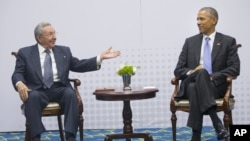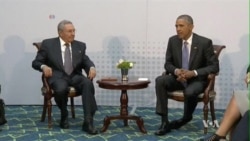U.S. President Barack Obama is back in Washington, following a historic face-to-face meeting with Cuban President Raul Castro and a first meeting with Venezuelan President Nicolas Maduro.
The talks with Castro in Panama were strongly criticized by some Republican presidential hopefuls.
U.S. Senator Ted Cruz of Texas said in a statement, "Keeping up a disturbing trend of this administration, President Obama is in the process of striking another very bad deal, now with the communist dictatorship of Cuba.
"President Obama's approach gives the Castros exactly what they want - economic relief and legitimacy on the international stage. ... The President said today that his unprecedented meeting with Raul Castro was a step towards the future. Unfortunately, he is leaving the Cuban people imprisoned in the past," he added.
Cruz, the son of an American mother and a Cuban father, would be the nation's first Hispanic president, if elected.
Former Florida Governor Jeb Bush said on Twitter: "Obama meets with Castro but refused to meet w/@netanyahu (Israeli Prime Minister Benjamin Netanyahu). Why legitimize a cruel dictator of a repressive regime?"
Talks in Panama
The historic talks in Panama, on the sidelines of the Summit of the Americas, came after Obama and Castro announced in December that they would move to normalize ties between the United States and communist Cuba after more than a half-century of animosity.
Obama characterized his meeting with Castro - the first sitdown between leaders of both nations in 50 years - as "candid and fruitful," while the White House said Obama voiced support for a peaceful dialogue between Venezuela's government and the opposition during brief talks with Maduro.
The president also said he will review recommendations to remove Cuba from the list of state sponsors of terrorism - another step that needs to be taken before embassies can reopen in Washington and Havana.
'Historic meeting'
“This is obviously a historic meeting. The history between the United States and Cuba is obviously complicated and over the years, a lot of mistrust has developed," Obama said.
But Obama said it is time to turn the page, and Castro agreed, saying, “I think that, fundamentally, what the (U.S.) president has expressed to you reflects the same as what we are thinking."
Yet the two acknowledged the differences that exist between the two governments.
Obama said the U.S. would speak out for democracy and human rights, and Cuba would raise concerns about U.S. policy as well.
"Over time, it is possible for us to turn the page and develop a new relationship between our two countries," the U.S. president said.
As for Castro, he told Obama he agreed with all the points he'd made and said he was open to discussion, but "we need to be patient, very patient.
"We might disagree on something today on which we could agree tomorrow," he said.
The Cuban leader said his government is willing to discuss all issues, including human rights if those discussions are respectful.
After Castro spoke, the men stood and shook hands.
At a late-afternoon news conference, Obama said that his trip to Panama City for his third Summit of the Americas reflected a new era of U.S. engagement in the region.
He said that part of his talks with Castro involved how to promote greater opportunities for the Cuban people, and how access to education could be expanded throughout Latin America.
"We are focused on the future and on what we can build and achieve together," he said.
Majority support
In response to a question, Obama said his outreach to Havana had majority support in the United States and overwhelming support in Cuba. And with regard to the U.S. removal of Cuba from Washington's state sponsors of terrorism list, he said he wanted to study recommendations from State Department officials "before we announce publicly what the policy outcome will be."
Obama called his talks with Castro - two previous visits by phone and Saturday's personal encounter - "candid and fruitful."
"We are able to speak honestly about our differences and concerns in ways that offer the possibility" of taking bilateral relations in a different direction, he said.
"What has been clear through the summit," he said, "is the unanimity that the leaders of Latin America think this is the right thing to do. They see the possibility of a more constructive dialogue that ultimately benefits the Cuban people. I am cautiously optimistic that, over coming months and years, this will lead to a different future for the Cuban people."
Asked whether his outreach ended the policy of regime change in Cuba, Obama said: "We are not in the business of regime change. We are in the business of making sure the Cuban people have freedom and chance to shape their own lives."
Cold War is over
But the U.S. leader wants to focus on the future and says he is not caught up in ideology.
“The Cold War has been over for a long time and I’m not interested in having battles that, frankly, started before I was born," Obama said.
Obama said he came to the summit to boost his engagement with the hemisphere.
At this summit, an event usually ignored by the U.S. media, a handshake and words of conciliation mark the start of a major shift of the landscape.
Some material for this report came from AP and AFP.
Watch a related video of a meeting between President Barack Obama and Cuban President Raul Castro:






